To help the professors who won last year's university teaching awards reflect upon their métier, The Reporter asked the following: What's the hardest thing about teaching? The easiest? The most unexpected when you started out?
Jackie Buxton
Department of English
LOUIS DUDEK TEACHING AWARD (DEPARTMENT OF ENGLISH STUDENTS' ASSOCIATION)
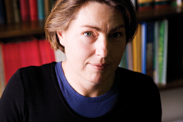
Claudio Calligaris
The easiest thing about teaching is the engagement and enthusiasm of McGill students. The hardest thing (and the most unexpected when I started out) is that while students value teaching excellence, many research institutions don't. That needs to change, with the institutional recognition that teaching and research are inevitably mutually constitutive.
My worst teaching moment was also one of my best; years ago, I was teaching a text assigned by my course director, one whose conclusion I simply couldn't fathom. I had fudged my way through one conference on the text, but was terrified of being asked to explain the short story's enigmatic ending. Finally, I decided to share my confusion with my class. The sky did not fall; there were no gasps of shock, merely a concerted group effort to help me to interpret and understand the text. I became a student in my own classroom; I remain a student in my own classroom. That is the way it should always be.
When I'm in front of a classroom of students looking out at me blankly, I think that it's time for me to stop being a talking head and check in with the students. Either they are confused, bored, not following (and this is equally applicable) it's that time of year and they have six essays to write in two days, or they have only had two hours sleep. Often, it's all of those. You'll never know if you don't ask.
Jim Nicell
Department of Civil Engineering
CLASS OF '44 AWARD FOR OUTSTANDING TEACHING (FACULTY OF ENGINEERING)
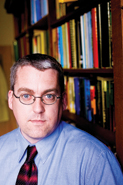
Claudio Calligaris
The hardest thing about teaching is maintaining a connection with students to make sure that they are not only hearing and understanding what you are saying but also gaining insight that goes beyond the material being presented. I think that independent insight on the part of the student is the basis of effective learning and a mark of good teaching.
The easiest thing about teaching is simply showing up. Everything else requires preparation, organization, focus and a great deal of energy.
The most unexpected thing that I realized as a teacher was how much influence I seemed to have on the formation of students' opinions. I was surprised that a significant number of students took everything I said to be absolute truth. This made me very conscious of the fact that it was my responsibility to clearly identify whether what I present is factual, the current state of understanding or opinion — my own or others.
Memorable moments? Not really. At least, none that I want to make public.
When I'm in front of a classroom of students looking out at me blankly, I regroup and try to tackle the subject at hand from a completely different direction. There are often many different ways of teaching the same concepts. I have found that just because a particular approach was successful with one group of students doesn't necessarily mean that it will be successful with the next group.
Srinivasan Krishnamurthy
Department of Gynecology and Obstetrics
OSLER TEACHING AWARD (FACULTY OF MEDICINE)
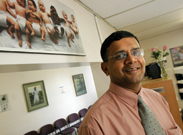
Owen Egan
The hardest thing about teaching is to know and utilize the tricks to keep the students attentive and focused.
The easiest is to be friendly, knowing that they are our future, and therefore invest the time that is necessary.
The most unexpected: their questions, of course!
When I'm in front of a classroom of students looking out at me blankly, I think of myself all those years ago, when I wanted someone to explain it to me in simple terms so that I could understand.
Marie Dagenais
Faculty of Dentistry
W.W. WOOD AWARD FOR EXCELLENCE IN TEACHING & HOWARD S. KATZ AWARD FOR EXCELLENCE IN TEACHING (FACULTY OF DENTISTRY)
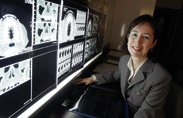
Owen Egan
The hardest thing about teaching is to change the way I teach. I have lots of ideas to make my lectures and clinics better. It is difficult to find the time to develop and implement my new ideas to improve my teaching. I hate giving the same lecture twice.
The easiest is not to change, to do the same thing all the time. I hope I will keep my enthusiasm and never be like that.
The most unexpected was that I never realized how much time it took to prepare a good lecture or organize a good clinical activity before I actually got to do it.
Memorable moment? I guess my classes are uneventful. The second-year dental students finish mid-June. Last year on a beautiful summer day, the students wanted the lecture to take place outside. I gave my lecture in the stairs of the Strathcona building. It was not ideal, and the students had to do more work on their own after, but they were really happy and sometimes it is worth doing things like that...
When I'm in front of a classroom of students looking out at me blankly, I think that I did not explain myself very well and I start my explanation all over again trying to find a simple analogy if possible.
Sharron Dorothy Wall
Public Relations
AWARD FOR DISTINGUISHED TEACHING (CONTINUING EDUCATION)
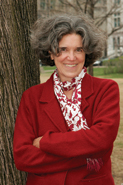
Owen Egan
The easiest and most rewarding thing about teaching is learning from the students; the hardest thing is not being able to sleep the night after class because my mind is racing: replaying the class, making plans for the following week... I would never have guessed that teaching on Wednesday night would become the highlight of my week.
The last two years in the PR program have been particularly exciting. We have developed a new program that is attracting highly qualified students with academic and practical backgrounds in marketing, communications, business and political science, to name a few. These classes take place at the end of everyone's day, when you would expect energy to be low, but when all these bright, curious people get together, the discussions and teamwork can be invigorating — at the very least they are rewarding and fun. Every term wonderful life-changing events take place: novices test their skills, break into the field; people find rewarding work, move ahead in their careers; the students help each other, make life-long relationships... the PR Certificate program has become a community of life-long learners I'm very proud to be part of.
I don't give a lecture course so I never stare at blank faces. The Communications classes are interactive workshops where there is never a dull moment. I create opportunities for communication to take place in an environment of both safety and risk-taking. The Public Relations students are natural communicators involved in areas as diverse as hip-hop music, banking, fashion and federal politics. They energize each other and I do my best to veer them toward new ideas and opportunities.
Arif Mustafa
Department of Animal Science
MACDONALD CAMPUS AWARD FOR TEACHING EXCELLENCE
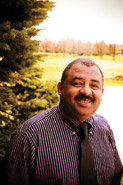
Claudio Calligaris
The hardest thing about teaching is to make the teaching materials up to date and interesting for a wide range of students. The easiest is the level of communication with the students. The most unexpected is the positive response I received from the students when I started teaching.
Memorable moments: for several years now, I have noticed that some of the students invited their friends to attend my lectures.
When I'm in front of a classroom of students looking out at me blankly, I think that I must be in the wrong classroom.
Derek Hart
Faculty of Management
DISTINGUISHED TEACHING AWARD IN FACULTY OF MANAGEMENT (GRADUATE)
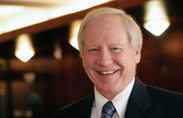
Owen Egan
Measuring student performance and assigning a grade is always difficult — especially a failing grade. Students who have failed often see me to apologize and I always wonder if I could have done more to help. The failure is often a result of non-academic factors that get in the way.
The easiest thing is the classroom delivery. I really enjoy the interaction. I try to ensure everyone enjoys the classroom experience. I'm lucky since the MBA class size allows this.
Students tell me that I get really excited about the material, which becomes infectious. I enjoy telling stories and weaving together the course content, a real-life situation and an example of how to use the statistical concept within this setting.
I started teaching when I was 22 years old and most of the students were not much younger than me. But on my first day a student walked up to me and said, "Can I ask you a question, Professor Hart?" This sounded strange to me: Hart was my father's name — it was so formal. I then realized they saw me not as a friend but as their teacher. I wondered if I could live up to the responsibility.
Memorable moments: I have had unexpected guests, from a belly dancer to a dog running around the front of my classroom. But there was one classroom experience from which everyone benefited. On the first day of class, a young lady walked into the classroom wearing black leather, with red streaks in her hair and tattoos as well as rings on most of her visible skin. All the other students sat away from her; she certainly had her space. Several weeks into the course, after the first test, in which she received the highest mark, I began to call on her in class (not before telling her). She was reticent and nervous. Suddenly the students realized that this young lady's exterior hid a strong academic. I drew her out and she grew more self-assured as the semester passed. By the end, she had not only the highest grade, but also many friends.
I have to say that I have never seen any of my MBA students look at me blankly; anxiously, maybe but not blankly. Professors use the body language of students to obtain the pulse of the class. These clues help me decide to either revisit the concept, provide another example or move forward. I am always adjusting my approach and tempo according to the signals I receive. I am always thinking about the next step.
Michael Bristol
Department of English
H. NOEL FIELDHOUSE AWARD FOR DISTINGUISHED TEACHING IN THE FACULTY OF ARTS
I guess the hardest thing about teaching is grading papers and dealing with students who are unhappy with their results. The easiest — or the most fun — is lecturing and interacting in class discussion. I started out such a long time ago that I really don't remember much about it, except that students were more interested in learning than I had expected them to be.
I was teaching a large lecture class on Contemporary Women's Fiction that included a lot of material on feminist theory. One day the students got into a huge debate about the theoretical meaning of women's lingerie. It was a memorable moment all right, but I don't know if it was good or bad. I do remember feeling out of place and — uncharacteristically — speechless.
When I'm in front of a classroom of students looking out at me blankly, I think I need to find a way to wake them up.
David Plant
Department of Electrical and Computer Engineering
CARRIE M. DERICK AWARD FOR EXCELLENCE IN GRADUATE TEACHING AND SUPERVISION
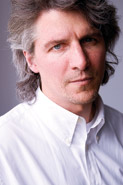
Claudio Calligaris
Hardest thing about supervising: convincing a student who is mid PhD (2-3 years into the program) that it's worth continuing. In my experience, most PhD students go through a doldrums period somewhere in the middle of their degree. The novelty of being a PhD student has worn off and the student hasn't quite produced the bulk of the results that will ultimately make up the PhD thesis. Easiest: sharing in the thrill of a successful result. Unexpected: the first time you experience the fact that the PhD student you are supervising has become the expert. This is by all means the desired result and something one hopes for as a supervisor. The first time it happens, it's both surprising and thrilling.
Attaining a doctorate degree is a significant accomplishment, thus, at the risk of sounding obvious, shaking hands with my PhD student after they have successfully completed their defense.
When I'm in front of a PhD student who is looking out at me blankly, I think the student is trying to determine "what next" in light of something like slow progress, a failed experiment, or a literature review that didn't lead to any obvious conclusions. I ask myself "How can I be both optimistic and realistic in terms of the guidance I must provide?" Supervising graduate students is an honour and a privilege and requires a delicate touch in difficult moments.
Rosalie Jukier
Faculty of Law
JOHN W. DURFORD TEACHING EXCELLENCE AWARD

Claudio Calligaris
I once heard it said that teaching is one-quarter knowledge and three-quarters acting. I don't agree at all. My law students are so smart that I couldn't act my way through any class. For me, the hardest thing about teaching is constantly being so on top of the material and prepared for my students' questions and comments. The easiest part about teaching is actually delivering the material once the preparation is done.
Some positive memorable moments occurred in a year where I was teaching a course for the first time and I included in the course evaluation a group assignment worth 20 percent that students had to present before the entire class. To my great surprise, the groups didn't just present. The first group put on a skit. The second one, not to be outdone, presented the material in the form of a game show. The next group, again not to be outdone, wrote a song! It was quite a term. I learned how creative, as well as smart, law students can be.
My negative memorable moment occurred when I was preparing for class and at the last moment, I found incredible photos illustrating the facts of a particular case. I quickly got copies of those photos, arranged for an overhead projector to be in the classroom, prepared the screen and dimmed the lights, only to discover that in my haste, I had forgotten to make acetates out of the printed photos! Quite embarrassing!
When I'm in front of a classroom of students looking out at me blankly, I think... that I have not done my job well. If I am prepared, interesting, provocative and inspiring — as I believe a professor has to be — then the faces I see are anything but blank!
John Galaty
Department of Anthropology
DAVID THOMSON AWARD FOR EXCELLENCE IN GRADUATE SUPERVISION & TEACHING
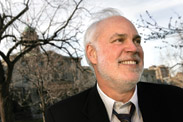
Owen Egan
In graduate teaching the hardest thing is to put limits on the students' work. Graduate students are curious and creative, and tend to expand their reading and thinking so much that the original question fades in importance. One of my tasks is to help them focus and limit their endeavours.
I feel it is my personal challenge to introduce them to new and often contradictory ideas and to convey to them the excitement of inquiry. In anthropology's aim to understand global, social and cultural diversity, it must, in effect, "create" its subject matter through ideas that help make sense of the effervescent flow of social life.
The easiest thing is to stimulate discussion, since graduate students usually do not read passively but passionately!
Memorable moments: one year, I seemed to have more than usual difficulty in setting up my audio-visual equipment and I appealed to an undergraduate class for help: is there anyone out there who can run this machine?! A few days later, the Tribune or the Daily issued a special award for the most technologically incompetent professor! In fun I trust.
This year while teaching in the African field study program in Kenya, I took a small group of students to a Maasai village in the late hours of the night, just before dawn, to witness a Maasai circumcision ceremony. Rather than being seen as intruders, the students were welcomed as honoured guests, and later returned for the festivities with two sheep they had purchased as gifts for the boy. What a marvellous way it was to teach about African ritual and the life cycle, not in the classroom but at the actual ceremony!
When I'm in front of a classroom of students looking out at me blankly, I think that it's up to me to bring something to the class that will rouse them. Without being put into a "frame," the intrinsic interest or importance of knowledge won't necessarily be apparent to a group of students. As a teacher I must provide a framework that makes clear "why" a certain body of facts matters, and "how" it can beinterpreted. Since a problem can often be interpreted in several different ways, I often try to teach about debates rather than about truths.
Robert David
Faculty of Management
DISTINGUISHED TEACHING AWARD IN FACULTY OF MANAGEMENT (UNDERGRADUATE)
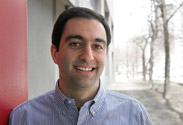
Owen Egan
What advice would I give to someone just starting out? The before, during and after all matter in teaching, and you have to attend to all three aspects. Before going into the classroom, give students interesting, relevant and current material to read. Old or weak readings demotivate students and make your job in the classroom an uphill struggle. Once in the class, you've got to be "on" all the time. For me, that means having a high energy level even when I don't feel my best. If you are enthusiastic and engaging, most students will jump on the bandwagon. Finally, the job doesn't stop when you walk out of the classroom. I put a lot of time into grading, which I do myself, and give lots of feedback to students. I also collect a lot of feedback from them, and try to improve the course for next time.
What do I like most? How great our undergraduates are. Absolutely wonderful — smart, motivated and (mostly!) hardworking.
What do I like the least? The students get younger every year!
John Abela
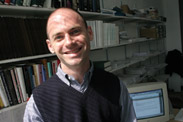
Owen Egan
Department of Psychology
LEO YAFFE AWARD FOR EXCELLENCE IN TEACHING (FACULTY OF SCIENCE)
Andrew Higgins
Department of Mechanical Engineering
IDA & SAMUEL FROMSON AWARD FOR OUTSTANDING TEACHING (FACULTY OF ENGINEERING)
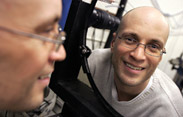
Owen Egan
The hardest things about teaching are the same as the hardest things about learning: convincing your class (or yourself) that the material is relevant and useful. Also, students arrive with preconceived notions, some correct, others not. It is very difficult to develop a topic from scratch when students already carry a lot of baggage: "It ain't so much the things we don't know that get us in trouble: it's the things we know that ain't so."
The easiest thing turned out to be how to please students: give them what they want, which is a clear accounting of what they will be responsible to know on exams, etcetera.
The most surprising is that small remarks you make, even off-hand or little throw-away comments, can actually stick with a student and have an impact. I have had students come back a year or more later and remind me of some comment I made in class that I don't even remember, but that had some resonance with them. This should not have been surprising, since I still recall small anecdotes that my professors shared more than 15 years ago. The trouble is, you don't know which comment will stick, so I've become very guarded about "shooting from the hip."
Memorable bad moments (and these happen quite often) are when, in the middle of a chalkboard derivation that I've reviewed and practiced beforehand, I suddenly start to doubt an assumption, or a step, or a particular chain of reasoning. It is easy to convince yourself you understand a topic, but to present it to a demanding audience is something else. I am more petrified in front of a class of undergraduates than in presenting a research talk in front of international colleagues. The undergraduate student will ask the question out of the blue that never crossed your mind before.
